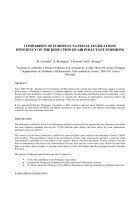Air Monitoring
COMPARISON OF EUROPEAN NATIONAL LEGISLATIONS EFFICIENCY ON THE REDUCTION OF AIR POLLUTANT EMISSIONS
Oct 06 2014
Author: M. Coutinho, R. Rodrigues, J. Ferreira and C. Borrego on behalf of CEM
ABSTRACT
Since 1995, IDAD – Institute for Environment and Development has carried more than 300 stack samples in various point sources of Portuguese industries. A coherent database was made with the collected results. The limit values fixed by the legal documents consulted – Portuguese, Spanish, French, Italian and Dutch emissions legislation – were applied to the IDAD stack sampling inventory to evaluate the efficiency of atmospheric emissions control and reduction, regarding the most important air pollutants: NOx, SO2 and particulate matter.
It was concluded that the Portuguese legislation is little restrictive and not much efficient as regards emissions reduction. In opposition, the Dutch and Italian legislations are quite restrictive and efficient concerning emission control for the three pollutants analysed.
INTRODUCTION
The atmospheric emissions in the actual Portuguese legislative framework are regulated by two diplomas: one settles the stack sampling standards (Decreto-Lei 352/90) and the other defines the limit values for some atmospheric pollutants (Portaria 286/93).
The control of point source emissions is defined by emission limit values settled in the document Portaria 286/93 referred above. This legislation is based on the specification of limit values expressed as mg.Nm-3, a measure of the concentration of pollutant or of the quality of the gaseous effluent. National legislations of other countries base the limit of atmospheric emissions on the establishment of a mass flow and one or two limit values. Below the mass flow there is no limit value to respect or, in some cases, there is a limit value higher than the one imposed above the mass flow limit.
The analysis of data presented in this paper has 3 objectives:
- Verify the compliance to the Portuguese legislation;
- Compare the Portuguese standards with other published in European countries;
- To discuss about the efficiency of the different diplomas on reducing atmospheric pollutants emissions.
Digital Edition
AET 28.2 April/May 2024
May 2024
Business News - Teledyne Marine expands with the acquisition of Valeport - Signal partners with gas analysis experts in Korea Air Monitoring - Continuous Fine Particulate Emission Monitor...
View all digital editions
Events
Jul 30 2024 Jakarta, Indonesia
China Energy Summit & Exhibition
Jul 31 2024 Beijing, China
2024 Beijing International Coal & Mining Exhibition
Aug 07 2024 Beijing, China
IWA World Water Congress & Exhibition
Aug 11 2024 Toronto, Canada
Aug 25 2024 Stockholm, Sweden and online






.jpg)








